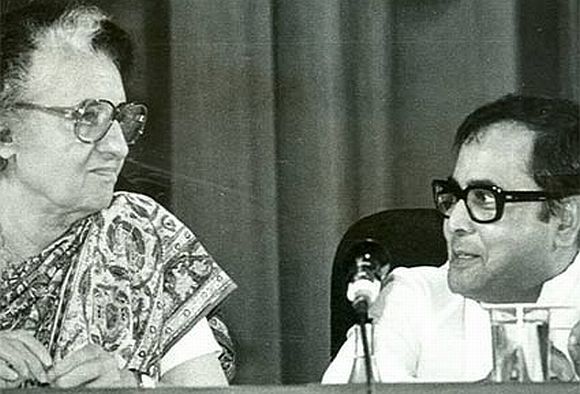'His assessment is wide off the mark from what is expected to be history's final verdict -- which is that Indira was the most unacceptable of all prime ministers because she was the only one who tried to throttle Indian democracy,' says Amulya Ganguli.

As a lifelong admirer of Indira Gandhi, it is not surprising that Pranab Mukherjee should have praised her as the most acceptable prime minister of all times.
Having risen to be the country's President, he should have chosen his words with greater care, if only because he is no longer expected to be the standard-bearer of any party.
Like a Lok Sabha Speaker, Mukherjee should have said goodbye to his earlier political affiliations.
Arguably, he may have been only expressing his personal views, unconnected with his former party.
In that case, it is odd that his assessment should be so wide off the mark from what is expected to be history's final verdict -- which is that Indira was the most unacceptable of all prime ministers because she was the only one who tried to throttle Indian democracy.
It is another matter that she did not succeed because of the politically fatal -- for her though fortuitous for the country -- misjudgement of calling for the elections in 1977.
Her mistake was due to the adulation she was receiving from her servile followers, one of whom -- then Congress party president Dev Kanta Borooah -- famously said, 'India is Indira, Indira is India.'
The fulsome praise and equally favourable reports about her rule in the censored media made her believe that the hoi polloi loved the Emergency.
Her hope apparently was that an electoral victory would put the stamp of popular approval on her draconian rule, enabling her to make it the 'new normal' of Indian politics.
Thankfully, the unwashed masses saw through her game and sent her packing at the first opportunity which they got.
For them, she was not 'acceptable' at all, as Mukherjee now believes.
The President's latest observation suggests that his understanding of that most fateful period of Indian history, when the future of democracy was at stake, is grievously flawed.
This skewed evaluation was also evident when he said some months ago that Sanjay Gandhi had some 'positive virtues.'
If so, these were invisible to all but the Congress loyalists, for even one of the enfant terrible's elders in the Nehru-Gandhi family, B K Nehru, called Indira's younger son 'wayward, uneducated, inexperienced.'
B K Nehru saw the reality as it was, not through the lens of party loyalty or to keep on the right side of the powers-that-be.
What is more, the waywardness and lack of education of the crown prince of that time was evident not only to a family member, but to almost everyone in the country.
Yet, Mukherjee ascribed the 'animosity and venom' against Sanjay to the 'euphoria surrounding the Janata Party's creation, a wave of anti-Indira Gandhi sentiment and the division in the Congress.'
As is known, the animosity was the result of the arbitrary manner in which Sanjay functioned, which was noted by the Shah Commission when it said that 'some of the demolitions (in Delhi) were carried out at the instance of and to pander to the whims of Shri Sanjay Gandhi who was not answerable to anybody and who held no position whatever in the administrative scheme.'
If his whims were the law, it was because he was the prime minister's son -- a state of affairs characteristic of a banana republic, which denotes another unacceptable feature of Indira's reign.
Mukherjee is right about the former prime minister's decisiveness, which included an elephant ride to Belchhi, a village in Bihar, in 1977, to a scene of a massacre of Dalits (because her car could not reach the place along the muddy road), which is believed to have led to the Congress return to power in the 1980 general election.
Even more memorable was her role during the liberation of Bangladesh.
But the Emergency was her Achilles' heel, tarnishing her name forever.
If only she had resisted the temptation of holding onto power by hook or by crook to negate an adverse judicial verdict, she might have been one of the acceptable PMs after Jawaharlal Nehru, who laid the foundation of Indian democracy and multicultural polity.
But as of now, she remains tainted.
What is more, her legacy is not only the burden of authoritarianism, which the Congress continues to carry, but also her fake 'socialism', which has been inherited by Sonia Gandhi and her son, the crown prince of today, thereby handing over the popular card of economic development to Narendra Modi.
CAPTION: Indira Gandhi, then prime minister of India, with Pranab Mukherjee, then one of her Cabinet ministers.
Amulya Ganguli writes on current affairs.
- MUST READ features in the RELATED LINKS ALONGSIDE...










